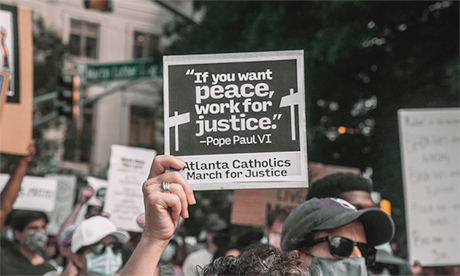Then the Lord said to Cain, “Where is your brother Abel?” He said, “I do not know; am I my brother’s keeper?” And the Lord said, “What have you done? Listen; your brother’s blood is crying out to me from the ground! And now you are cursed from the ground, which has opened its mouth to receive your brother’s blood from your hand.” (Gen 4:9–11)
In yet another iteration of state-sanctioned police brutality, the United States has witnessed the killing of George Floyd by police officer Derek Chauvin in Minneapolis, Minn.
In harrowing fulfilment of what political philosopher Hannah Arendt once defined counter-intuitively as the “banality” of evil, Officer Chauvin seemed frighteningly calm as he slowly asphyxiated Mr Floyd with his knee outside a corner store: eight minutes and 46 seconds of deafening, uncontested silence, save the plaintive protest of a passerby, and Mr Floyd himself, gasping for enough air to call for his mother.
How do we protest such a grotesque execution of injustice? How indeed do we cry out against its quiet collusion with systemic racism, which shapeshifts in response to each civil rights victory in order to ensure its transmission to the next generation?
An inventory of our treasures
As a Catholic, it has been both encouraging and indicting to follow the Catholic Church’s response to the death of George Floyd: from watching clerical leadership denounce the “real and present danger” and “ongoing reality” of racism in America; to hearing lay prophetic voices, including EWTN radio show host Gloria Purvis, calling us to consider the extent to which racism has become an ecclesial “blindspot” among white American Catholics; to finding so few Catholic Church communities marching alongside our Christian and non-Christian brothers and sisters.
Why are we not, as Presbyterian minister Rev Alexis Waggoner of the Church of the Village in New York City recently described it, “putting [our] body where [our] theology is”?
Perhaps, in fact, we are: Increasingly privatized religion means privatized bodies. We have fulfilled, not forgotten, our seclusive theology.
At worst, Christians have preferred instead to cry foul in the face of church property damage and graffiti, blithely unaware that our central liturgical image is the crucified Christ, whose body was broken by violence and adorned with Roman graffiti, “INRI.”
That is to say, our fidelity to Christ and his body the church has less to do with becoming an aggrieved church of fire damage than a compassionate church of kinship with the broken.
Saint John Henry Cardinal Newman once opined concerning the Christian intellectual and spiritual tradition, “[w]e have a vast inheritance, but no inventory of our treasures.”
In a brief attempt to take stock of our shared inventory, then, and likewise to advocate a more self-consciously incarnational practice of Christianity in the world, I would like to propose that Christianity is best understood in nature and practice as a form of protest.
Who God is in the world
That is, Christianity offers a radically divergent vision of how humanity might confront, interrupt, and heal experiences of violence, suffering and loss, and in so doing both reveal and enact who God is in the world: the God of boundless compassion for the afflicted, the morally outcast and the enemy; and the God of unity, that binds together the “beloved community” in charity against temptations to self-conceit, the abuse of power, and indifference to the poor.
To begin, Christianity as protest reveals who God is in the world. Let us begin with the daring, plaintive story of the Book of Job. Continue reading
